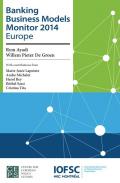Richter, W. (2014) “The Wrath of Draghi: First German Bank Hits Savers with Negative Interest Rate“, ΘZeroHedge, 30 Οκτωβρίου. Deutsche Skatbank, a division of VR-Bank Altenburger Land, which was founded in 1859, is not the biggest bank in Germany, but it’s the first bank to confirm what German savers have been dreading for a while: the wrath of Draghi. Retail and business customers with over €500,000 on deposit as …Read More
Reflections on the new ‘Secular Stagnation hypothesis’
Summers, L. (2014) “Reflections on the new ‘Secular Stagnation hypothesis’“, VoxEU Organisation, 30 Οκτωβρίου. The notion that Europe and other advanced economies are suffering secular stagnation is gaining traction. This column by Larry Summers – first published in the Vox eBook “Secular Stagnation: Facts, Causes and Cures” – explains the idea. It argues that a decline in the full-employment real interest rate coupled with low inflation could indefinitely prevent …Read More
Making sense of the comprehensive assessment
Acharya, V. & Steffen, S. (2014) “Making sense of the comprehensive assessment“, VoxEU Organisation, 29 Οκτωβρίου. The ECB conducted a comprehensive assessment of banks and identified capital shortfalls for 25 banks, totalling €25 billion. In this column, the authors provide a number of benchmark stress tests to estimate capital shortfalls. The analyses suggest possible capital shortfalls between €80 billion and more than €700 billion depending on the model. They …Read More
Income and Wealth Distribution in Germany: A Macroeconomic Perspective
Van Treeck, Τ. (2014) “Income and Wealth Distribution in Germany: A Macroeconomic Perspective“, The Institute Blog, 29 Οκτωβρίου. Household economic surveys, such as the German Socio-Economic Panel, notoriously underestimate the degree of income and wealth inequality at the upper end of the distribution. To combat this, a new approach developed by Thomas Piketty and co-authors analyzes tax return data in an attempt at better measuring top incomes and wealth. …Read More
Why Keynes is Important Today
Temin, P. & Vines, D. (2014) “Why Keynes is Important Today“, Institute for New Economic Thinking, 28 Οκτωβρίου. Macroeconomists have been notably unhelpful in explaining and recommending policies since the global financial crisis of 2008. How could this have happened? Since John Maynard Keynes created macroeconomics in the 1930s, the field has grown to be half of all introductory courses in economics and has become well represented and respected …Read More
A 100-year perspective on sovereign debt composition in 13 advanced economies
Ali Abbas, S. M., Blattner, L., De Broeck, M., El-Ganainy, A. & Hu, M. (2014) “A 100-year perspective on sovereign debt composition in 13 advanced economies“, VoxEU Organisation, 27 Οκτωβρίου. There has been renewed interest in sovereign debt since the Global Crisis, but relatively little attention has been paid to its composition. Sovereign debt can differ in terms of the currency it is denominated in, its maturity, its marketability, …Read More
The Scariest Number Revealed Today: $1.114 Trillion In Eurozone Bad Debt
Durden, D. (2014) “The Scariest Number Revealed Today: $1.114 Trillion In Eurozone Bad Debt“, ΘZeroHedge, 26 Οκτωβρίου. As we previously reported, the ECB’s latest stress test was once again patently flawed from the start. Why? Because as we noted earlier, in its most draconian, “adverse” scenario, the ECB simply refused to contemplate the possibility of deflation. And here’s why. Buried deep in the report, on page 75 of 178, …Read More
Remember Europe’s “austerity”, or rather as we dubbed it, fauxterity?
Durden, T. (2014) “Remember Europe’s “austerity”, or rather as we dubbed it, fauxterity?“, ΘZeroHedge Blog, 24 Οκτωβρίου. Of course, how could you forget: after all everything that is wrong with Europe is blamed not on government corruption and the complete lack of reform, enabled so gloriously by Goldman’s custodian of Europe’s money printer who would do “whatever it takes” to mask Europe’s sad reality that without reform the continent …Read More
Banking Business Models Monitor 2014: Europe
Ayadi, R. & De Groen, W. P. (2014) “Banking Business Models Monitor 2014: Europe“, CEPS Paperbacks, Financial Markets, 14 Οκτωβρίου. CEPS and the International Observatory on Financial Services Cooperatives (IOFSC) at HEC Montreal have initiated an annual monitoring exercise on banking business models in the EU. Based on their balance sheet structures, 147 European banks that account for more than 80% of the industry assets were categorised in four …Read More
Europe’s fiscal wormhole – with all of the rules pointing toward recession, how can Europe boost recovery?
Wolff, B. G. (2014) “Europe’s fiscal wormhole – with all of the rules pointing toward recession, how can Europe boost recovery?“, Project Syndicate, 24 Οκτωβρίου. Τhe International Monetary Fund now estimates a 30% risk of deflation in the eurozone, and growth figures within the monetary union continue to disappoint. But policymakers seem trapped in a cat’s cradle of economic, political, and legal constraints that is preventing effective action. The …Read More





